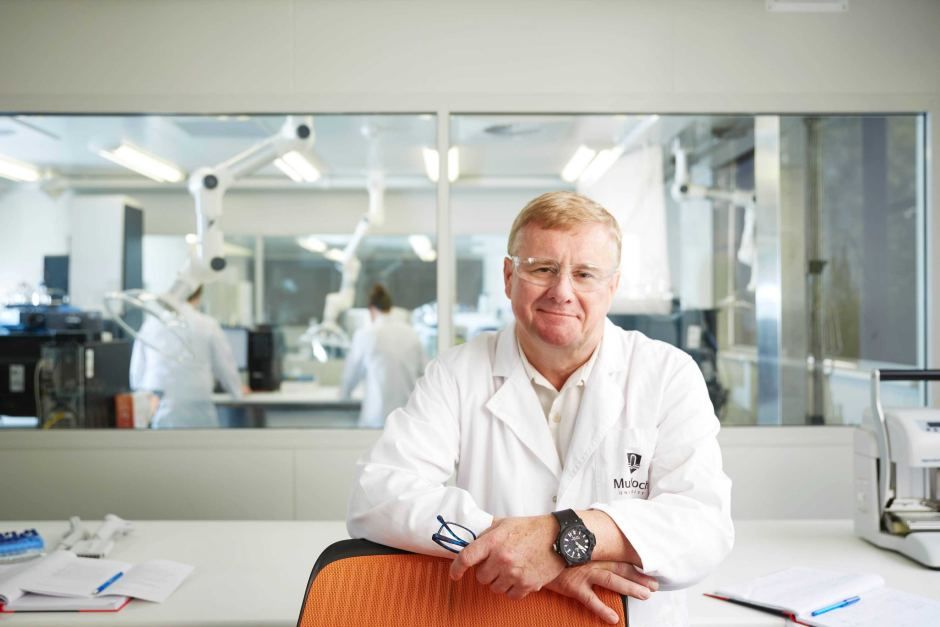
From Genomics to Geography: Exploring Drivers of Lung Cancer Treatment and Outcome in Aboriginal and remote populations in Western Australia
|
CHIEF INVESTIGATOR |
Dr Andrew Fantoni - Advanced Trainee | Medical Oncology, Fiona Stanley Hospital |
|
GENEROUSLY DONATED BY |
Fewster Family |

Does the fitness of the immune system affect how blood cancers respond to effector cell therapies?
|
CHIEF INVESTIGATOR |
Dr Collin Chin - Consultant Haematologist, Rockingham General Hospital |
|
GENEROUSLY DONATED BY |
Rotary Club of Fremantle & Attadale |

Development of a novel objective method to program middle ear implants to optimise hearing for patients.
|
CHIEF INVESTIGATOR |
Dr Marcus Voola - Audiologist, Fiona Stanley Hospital |
|
GENEROUSLY DONATED BY |
City of Cockburn |

Pragmatic trial of lifestyle interventions to reduce Group B Strep colonisation in pregnancy
|
CHIEF INVESTIGATOR |
Ms Nicole Catalano - Neonatal Research Midwife/ Clinical Midwife, SMHS |
|
GENEROUSLY DONATED BY |
Stan Perron Charitable Foundation |

Exploring the benefits of drugs used to treat high cholesterol in breast cancer treatment.
|
CHIEF INVESTIGATOR |
Dr Andrew Redfern - Consultant Medical Oncologist, SMHS |
|
GENEROUSLY DONATED BY |
Fremantle Hospital Ladies Auxilliary |

LuCape Study: Investigating Combined PSMA-Targeted Radioactive Treatment and Capecitabine Chemotherapy to Improve Advanced Prostate Cancer Care for Men
|
CHIEF INVESTIGATOR |
Dr Tom Ferguson - Medical Oncology Consultant, Fiona Stanley Hospital |
|
GENEROUSLY DONATED BY |
Austal Staff and Company |

Finding treatment that blocks damaging antibodies for autoimmune muscle disease sufferers.
|
CHIEF INVESTIGATOR |
Prof Merrilee Needham - Consultant Neurologist, Fiona Stanley Hospital |
|
GENEROUSLY DONATED BY |
SMHS Staff Giving |

Using mushroom extract (Ergothioneine) to protect hearts during transplantation.
|
CHIEF INVESTIGATOR |
Dr Warren Pavey - Staff Specialist Anaesthetist, Fiona Stanley Hospital |
|
GENEROUSLY DONATED BY |
Mr Len and Mrs Fran Mihaljevich & Mr David Clegg |

Uncovering therapeutic targets in aggressive brain melanoma.
|
CHIEF INVESTIGATOR |
Dr Yu Yu - Senior Research Fellow, Curtin University |
|
GENEROUSLY DONATED BY |
Janine Chalwell Grant for Melanoma Research committee |

Barry Marshall Travel Award 2023
|
AWARD RECIPIENT |
Dr Lisa van der Lee - Physiotherapist, Fiona Stanley Hospital |
|
GENEROUSLY DONATED BY |
Professor Barry Marshall AC and Mrs Adrienne Marshall & Business Events Perth |
“This travel grant enabled me to attend the Australian and New Zealand Intensive Care/Australian College of Critical Care Nurses ASM “ICU on the Edge”, which was held at the Adelaide Convention Centre on 29th-31st March 2023, to present research entitled “Clinician emotional labour strongly influences early mobilisation of ICU patients with major burns” as a poster. This qualitative study was a Curtin University Physiotherapy Honours student project for which I was the lead/senior supervisor. At the conference I received some positive feedback from multidisciplinary delegates who felt the findings of the study resonated with them and their experiences related to the challenges of managing patients with major burns in ICU.“

Barry Marshall Travel Award 2023
|
AWARD RECIPIENT |
Professor Nina Tirnitz-Parker - Medical Researcher, Curtin University |
|
GENEROUSLY DONATED BY |
Professor Barry Marshall AC and Mrs Adrienne Marshall & Business Events Perth |

Barry Marshall Travel Award 2023
|
AWARD RECIPIENT |
Dr William Crohan - Doctor (Surgical Registrar), Fiona Stanley Hospital |
|
GENEROUSLY DONATED BY |
Professor Barry Marshall AC and Mrs Adrienne Marshall & Business Events Perth |
“Between November 6th and 13th, I embarked on a flight to South Korea, to participate in the 2023 Asia Pacific Cochlear Implant Scientific Conference held in Seoul. This expedition marked a significant turning point in my academic journey, providing a global stage to present my Ph.D. research for the first time. Focused on the interplay of mechanical factors impacting hearing preservation and the integration of robotic assistance in cochlear implantation, I sought to learn as much as possible and meet potential research partners, whilst contributing knowledge and a fresh perspective to the discourse on robotic implantation.“

Nicholas Way Fund for Early Career Research 2023
|
AWARD RECIPIENT |
Ms Andrea Lyon - Mental Health Nurse, SMHS/ECU |
|
GENEROUSLY DONATED BY |
Professor Sue Fletcher AO FAHMS |

Nicholas Way Fund for Early Career Research 2023
|
AWARD RECIPIENT |
Ms Aska Jie Yang - Senior Dietician, Fiona Stanley Hospital |
|
GENEROUSLY DONATED BY |
Professor Sue Fletcher AO FAHMS |

Nicholas Way Fund for Early Career Research 2023
|
AWARD RECIPIENT |
Ms Sarah Hug - Physiotherapist, Curtin University |
|
GENEROUSLY DONATED BY |
Professor Sue Fletcher AO FAHMS |
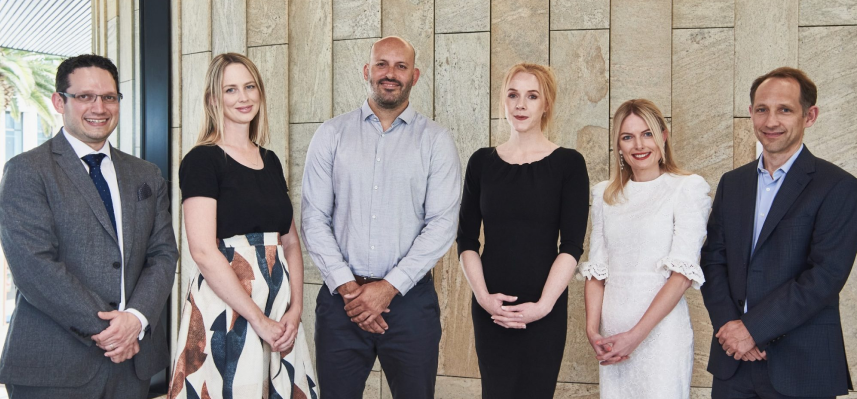
Spinnaker Health Research Foundation Grant Recipients 2023 pictured from left: Dr Dror Maor, Ms Kathryn Watson, Dr Rodrigo Carlessi, Ms Rebecca Hahn, Ms Sarah Clarke, Dr Duncan Purtill

Predicting liver cancer risk to improve early detection and patient outcomes
|
CHIEF INVESTIGATOR |
Dr Rodrigo Carlessi - Research Fellow, Curtin University |
|
GENEROUSLY DONATED BY |
Mr Len and Mrs Fran Mihaljevich & Mr David Clegg |

Development of a new blood test to identify high risk multiple myeloma
|
CHIEF INVESTIGATOR |
Ms Sarah Clarke - Medical Scientist – PathWest, Fiona Stanley Hospital |
|
GENEROUSLY DONATED BY |
Austal Company and Staff |

Improving bone mineral density estimation from DXA scans of the forearm using AI techniques - facilitating early screening for osteoporosis
|
CHIEF INVESTIGATOR |
Dr Ashu Gupta - Medical Oncology Consultant, Fiona Stanley Hospital |
|
GENEROUSLY DONATED BY |
Fremantle Hospital Ladies Auxiliary |

A new method of detecting whether medications used in heart failure patients can damage the heart itself
|
CHIEF INVESTIGATOR |
Ms Rebecca Hahn - Cardiothoracic Research Nurse, Fiona Stanley Hospital |
|
GENEROUSLY DONATED BY |
Fewster Family |

Improving outcomes for patients with myelofibrosis receiving bone marrow transplant treatment
|
CHIEF INVESTIGATOR |
Dr Duncan Purtill - Consultant Physiologist (Haematology), Fiona Stanley Hospital |
|
GENEROUSLY DONATED BY |
The Rotary Club of Fremantle and Attadale |

Use finger-prick testing to check blood levels of methotrexate of patients with rheumatoid arthritis
|
CHIEF INVESTIGATOR |
Dr Chanakya Sharma - Consultant (Rheumatology), Fiona Stanley Hospital |
|
GENEROUSLY DONATED BY |
The City of Cockburn |

Comprehensive Understanding of the effects of inflammation during Pregnancy and early life on Infant immune Development (CUPID) study
|
CHIEF INVESTIGATOR |
Prof Shailender Mehta - Consultant Paediatric Neonatologist, Fiona Stanley Hospital |
|
GENEROUSLY DONATED BY |
The Stan Perron Charitable Foundation |

Barry Marshall Travel Award 2022
|
AWARD RECIPIENT |
Ms Kathryn Watson - Physiotherapist, Fiona Stanley Hospital |
|
GENEROUSLY DONATED BY |
Professor Barry Marshall AC and Mrs Adrienne Marshall & Business Events Perth |

Nicholas Way Fund For Early Career Research
|
AWARD RECIPIENT |
Dr Tess Evans - Advanced Trainee Registrar (ICU), Fiona Stanley Hospital |
|
GENEROUSLY DONATED BY |
Professor Sue Fletcher AO FAHMS |
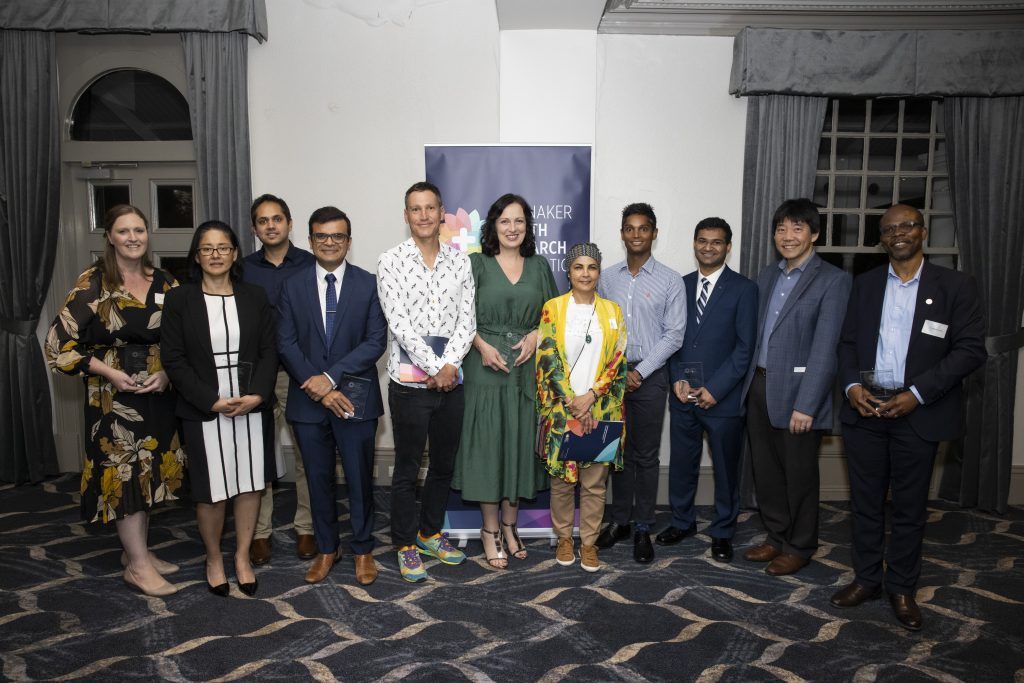
Spinnaker Health Research Foundation Grant Recipients 2022 pictured from left: Dr Lydia Warburton, A/Prof Elin Gray, Dr Raj Uchila, Dr Puraskar Pateria, Dr Ed Litton recieving on behalf of Dr Tess Evans, Cathy Latino,Dr Dayse Tavora-Vieira recieving on behalf of Dr Jafri Kuthubutheen, Mr Ashan Weerakkody, Prof Shailander Methta, Professor Bu Yeap recieving on behalf of Dr Nick Lan and Dr Oyekoya Ayonrinde

Septic shock and the gut microbiome in critically ill adults: A prospective cohort study
|
CHIEF INVESTIGATOR |
Dr Tess Evans, Intensive Care Registrar, Fiona Stanley Hospital |
|
GENEROUSLY DONATED BY |
SMHS Staff giving for Spinnaker Grant |

The changing epidemiology of fatty liver in regional Australia – a cohort study
|
CHIEF INVESTIGATOR |
Dr Raj Uchila, Consultant Gastroenterologist, SMHS |
|
GENEROUSLY DONATED BY |
Len and Fran Mihaljevich |

Stroke survivors and carers’ experiences of modified constraint-induced movement therapy in an early-supported discharge rehabilitation service
|
CHIEF INVESTIGATOR |
Mr Ashan Weerakkody, Senior Physiotherapist- Neurology/Stroke, SMHS |
|
GENEROUSLY DONATED BY |
Fremantle Hospital Ladies Auxiliary |

Dulaglutide or semaglutide and Vascular Inflammation in Coronary Ischaemia; a Positron Emission Tomography Study (DAVINI-PET)
|
CHIEF INVESTIGATOR |
Dr Nick Lan, Trainee Registrar- Cardiology, Fiona Stanley Hospital |
|
GENEROUSLY DONATED BY |
Austal Company and Staff |

Identification of risk stratification and prognostic biomarkers by using the GeoMx digital spatial profiler for patients with Barrett’s oesophagus
|
CHIEF INVESTIGATOR |
Dr Puraskar Pateria, Consultant Gastroenterologist, Fiona Stanley Hospital |
|
GENEROUSLY DONATED BY |
David Clegg |

Acquisition of skin and gut microbiota in neonates born via water-birth (AQUA STUDY)
|
CHIEF INVESTIGATOR |
Prof Shailander Mehta, Consultant Paediatric Neonatologist, Fiona Stnaley Hospital |
|
GENEROUSLY DONATED BY |
The Stan Perron Charitable Foundation |

Determining factors that underpin cardiovascular disease risk in young adults with fatty liver diagnosed during adolescence ten years earlier – a longitudinal cohort study
|
CHIEF INVESTIGATOR |
Dr Oyekoya Ayonrinde, Consultant Gastroenterologist, Fiona Stanley Hospital |
|
GENEROUSLY DONATED BY |
The City of Cockburn |

The use of AI in the analysis of video otoscopic images of the tympanic membrane to aid in the diagnosis of ear disorders – a pilot study
|
CHIEF INVESTIGATOR |
Dr Jafri Kuthubutheen, ENT Consultant, SMHS |
|
GENEROUSLY DONATED BY |
The Rotary Club of Fremantle and Attadale |

Extracellular Vesicles Profiling as a Signature of Response to Immunotherapy
|
CHIEF INVESTIGATOR |
Dr Lydia Warburton, Medical Oncology Consultant, Fiona Stanley Hospital |
|
GENEROUSLY DONATED BY |
Janine Chalwell Innovation Grant 2022 |

Multimodal Liquid biopsy to Predict Response of Melanoma to Immuno-Oncology
|
CHIEF INVESTIGATOR |
A/Prof Elin Gray, A/Prof of Cancer Research and Deputy Director of the ECU Strategic Research Centre for Precision Health |
|
GENEROUSLY DONATED BY |
Janine Chalwell Gift 2022 |

The Effect of Dietary Resistant Starch on Maternal Glycaemia and the Gut Microbiome in Gestational Diabetes.
|
CHIEF INVESTIGATOR |
Mrs Cathy Latino, Senior Dietitian, Fiona Stanley Hospital |
|
GENEROUSLY DONATED BY |
ECU Spinnaker Explorers Grant 2022 |
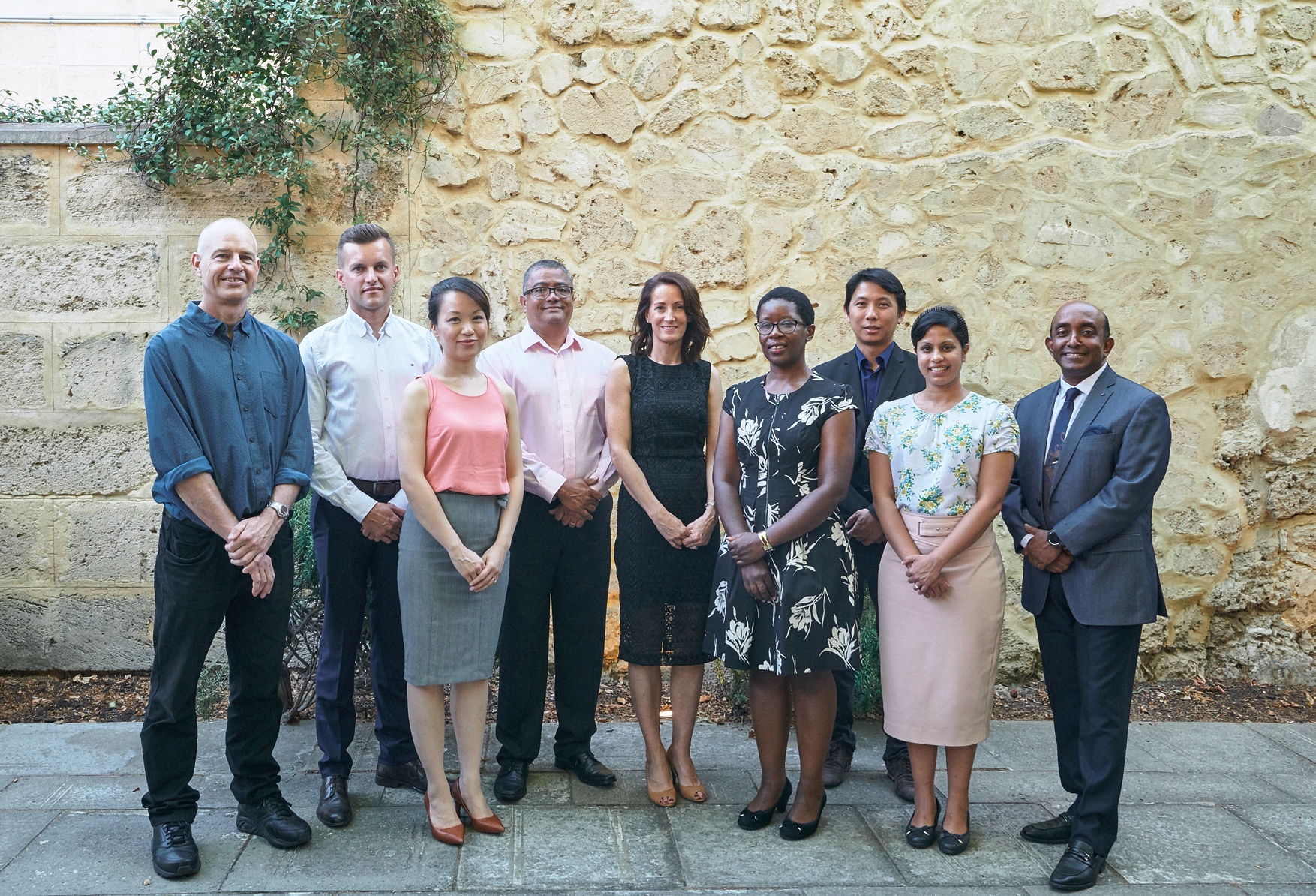
Spinnaker Health Research Foundation Grant Recipients 2020 pictured from left: Dr Jeremy Parry, Dr Michal Luniewski, Dr Lena Thin on behalf of Dr Abhey Singh, Dr Herbert Ludewick, Mrs Fiona Poelchow, Dr Jesica Makanyanga, Dr Teng Fong Ng, Dr Shereen Paramalingam, and Prof Yogesan Kanagasingam. Missing from image: Prof Dickon Hayne.

Whole Body PET-CT scan to diagnose and manage myositis
|
CHIEF INVESTIGATOR |
Dr Shereen Paramalingam, Consultant Rheumatologist, Fiona Stanley Hospital, PhD Student – The University of Notre Dame Australia |
|
GENEROUSLY DONATED BY |
The Rotary Club of Attadale |

SUBDUE-1
|
CHIEF INVESTIGATOR |
Prof Dickon Hayne, Head of Urology, Fiona Stanley Hospital & Professor of Urology – The University of Western Australia |
|
GENEROUSLY DONATED BY |
SMHS Doctors who Donate |

Artificial intelligence-based eye screening for patients with diabetes at Fremantle Hospital
|
CHIEF INVESTIGATOR |
Prof Yogi Kanagasingam, Research Director, CSIRO Australian e-Health Research Centre & Adjunct Professor, School of Medicine – The University of Notre Dame Australia |
|
GENEROUSLY DONATED BY |
Fremantle Hospital Ladies Auxiliary |

Detecting high risk genetic changes in patients with myeloproliferative disorders
|
CHIEF INVESTIGATOR |
Dr Teng Fong Ng, Consultant Haematologist, Rockingham General Hospital |
|
GENEROUSLY DONATED BY |
SMHS Staff Lottery for Spinnaker players |

Can testosterone help treat men with Crohn’s disease?
|
CHIEF INVESTIGATOR |
Dr Abhey Singh, Gastroenterologist, Fiona Stanley Hospital |
|
GENEROUSLY DONATED BY |
Austal Company and Staff |

Can hyperbaric oxygen therapy improve remission rates in acute severe ulcerative colitis?
|
CHIEF INVESTIGATOR |
Dr Jesica Makanyanga, Gastroenterologist, Fiona Stanley Hospital |
|
GENEROUSLY DONATED BY |
Len and Fran Mihaljevich |

Tapping the video goldmine: how technologies used by tech giants for video analysis could inspire an improved way to diagnose and measure cancer in biopsies
|
CHIEF INVESTIGATOR |
Dr Jeremy Parry, Anatomical Pathologist, PathWest, Fiona Stanley Hospital |
|
GENEROUSLY DONATED BY |
David Clegg |

Development of a new drug for chronic nerve pain
|
CHIEF INVESTIGATOR |
Dr Michal Luniewski MD FANZCA, Consultant Anaesthetist, Fiona Stanley Hospital |
|
GENEROUSLY DONATED BY |
The City of Cockburn |

A study of the effects of a silicone-based topical dressing on the rate of wound healing, pain and scarring outcomes in donor site wounds, and in burns to the face in comparison to standard care.
|
CHIEF INVESTIGATOR |
Mrs Fiona Poelchow, Senior Occupational Therapist, State Adult Burns Service of WA, Fiona Stanley Hospital |
|
GENEROUSLY DONATED BY |
The Rotary Club of Attadale |

Establishing an accurate diagnostic tool for lung transplant rejection
|
CHIEF INVESTIGATOR |
Dr Herbert Ludewick, Heart & Lung Research Institute, Harry Perkins Institute for Medical Research at Fiona Stanley Hospital |
|
GENEROUSLY DONATED BY |
The Stan Perron Charitable Foundation |

Top Left: Dana Henderson (CEO), Jade Ferullo, Dr Adrian Pannekoek, Dr Mark Johnson, Helen Warnock, Steve Robertson, Dr Natalie Morellini, Dr Benjamin Dessauvagie, Mark Balfour (Chairman) Bottom left: A/Prof Timothy Fairchild, Dr Jerome Coudert, Dr Helen Keen, Prof Merrilee Needham, Mark Rintoul.

"Preserving the endothelial glycocalyx in patients undergoing , cardiopulmonary bypass. A prospective randomised interventional pilot study of doxycycline and lidocaine."
|
CHIEF INVESTIGATOR |
"Dr Mark Johnson, Dr Adrian Pannekoek" |
|
GENEROUSLY DONATED BY |
Rotary Club of Fremantle |

"A pilot study of healthy volunteers to compare the performance, of standard nasal oxygen cannula at high flows with the “Optiflow” high flow nasal oxygen (HFNO) system."
|
CHIEF INVESTIGATOR |
"Dr Gary Devine, Dr Mark Johnson" |
|
GENEROUSLY DONATED BY |
Doctors Who Donate and Staff that Support |

"Pilonidal Sinus Disease: Western Australia Metropolitan - Definitive Surgical Practice Preferences, Outcomes and Patient Perspective"
|
CHIEF INVESTIGATOR |
Dr Munya Nyandoro |
|
GENEROUSLY DONATED BY |
Fremantle Hospital Ladies Auxiliary |

"Utilisation of FISH as a diagnostic adjunct for , pancreatobiliary tract malignancy on cytology cell block specimens"
|
CHIEF INVESTIGATOR |
"Dr Benjamin Dessauvagie, Dr Chris Van Vliet, Dr Alina Miranda" |
|
GENEROUSLY DONATED BY |
Lloyd and Mary Marchesi |

"Cardiovascular and metabolic disease risk factors in children who, are overweight or obese: Assessing the role ofcardiorespiratory fitness and adiposity."
|
CHIEF INVESTIGATOR |
"A/Prof Timothy Fairchild, Dr Janine Spencer, Ms Allison Climie-Holmes, Ms Stephanie Dowden, Prof Niels Wedderkopp" |
|
GENEROUSLY DONATED BY |
Austal Company and Staff |

"Blocking of autoantibodies using oligonucleotides in, Inclusion Body Myositis – a potential new specific therapy."
|
CHIEF INVESTIGATOR |
"Dr Jerome Coudert, Prof Merrilee Needham, Dr Rakesh Veedu, Prof Sue Fletcher, Dr Chris Bundell, Dr Anna Brusch" |
|
GENEROUSLY DONATED BY |
Freo Doctor Lottery |

"Clarifying the role of alpha1-adrenoceptors in painful , cutaneous scars following burn injury"
|
CHIEF INVESTIGATOR |
"Dr Natalie Morellini, Prof Eric Visser, Prof Peter Drummond" |
|
GENEROUSLY DONATED BY |
Dave Clegg |

"Takotsubo Cardiomyopathy: truly a syndrome of cardiac, catecholamine excess?"
|
CHIEF INVESTIGATOR |
"Prof Girish Dwived, Prof Markus Schlaich, Dr James Rankin, A/Prof Roslyn Francis" |
|
GENEROUSLY DONATED BY |
Len and Fran Mihaljevich |

Cardiovascular risk in gout
|
CHIEF INVESTIGATOR |
"Dr Helen Keen, Prof Girish Dwivedi, Dr Kelly Morgan, Dr Dipen Sankhesara" |
|
GENEROUSLY DONATED BY |
Attadale Rotary Club |

"Association of HLA with anti-cN1A antibodies in IBM patients: , identifying genetic backgrounds that affect"
|
CHIEF INVESTIGATOR |
"Prof Merrilee Needham, Dr Jerome Coudert, Dr Chris Bundell, A/Prof Abha Chopra, Dr Anna Brusch" |
|
GENEROUSLY DONATED BY |
Stan and Jean Perron |
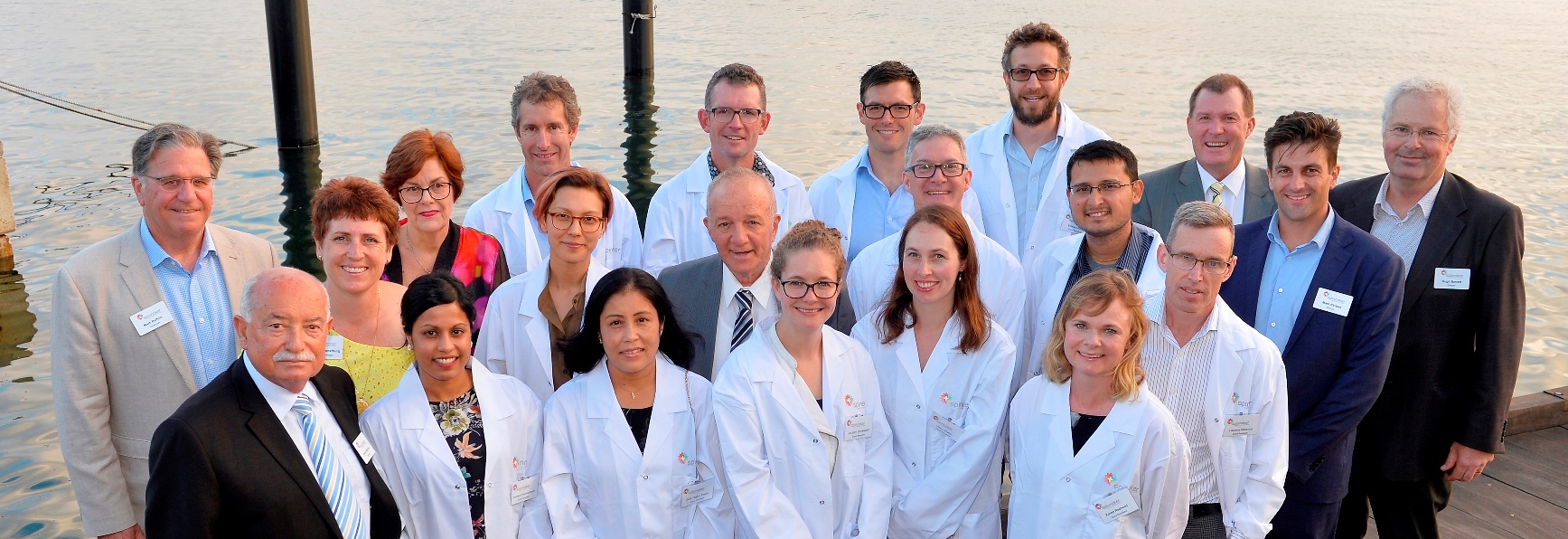
2018 Grant recipients with Foundation Board members

Identification of an aggressive Subtype of Colorectal Cancer
|
Research team |
Dr Andrew Laycock, Dr Jacqueline Bentel, Dr Michael Texler |
|
|
|
Bowel cancer is common in Western Australia and although treatment can have severe short-term and long-term side-effects, many patients are successfully treated with combinations of surgery, radiotherapy and drug therapies. Our study will develop specialised tests to identify bowel cancers which are likely to have worse outcomes. This will allow the affected patients to receive additional treatment and more frequent monitoring, while sparing other patients who have less aggressive cancers. The reduced costs and decreased side-effects of unnecessary cancer treatment will improve the quality of life of cancer patients and cancer survivors while providing savings to the WA healthcare system.

Peripheral muscle function in chronic heart failure: key to lessening the cardiac load
|
Research team |
A/Prof Andrew Maiorana, Prof Luke Haseler , Prof Girish Dwivedi |
|
|
|
To improve the quality of life in chronic heart failure patients we will exercise train the leg muscles and breathing muscles to determine how effectively leg training, breathing training or both leg and breathing will improve the ability of heart failure patients to exercise.
This research will provide a new understanding of why exercise intolerance in chronic heart failure patients is so severe and provide the basis for future integration of innovative and low cost therapies into the clinical management of chronic heart failure, with the ultimate goal of alleviating the suffering caused by cardiovascular disease in Australia.

Circulating tumour DNA (ctDNA) as a biomarker of disease status and treatment response in breast cancer patients
|
Research team |
Dr Benjamin Dessauvagie, Dr Hilary Martin, Prof Christobel Saunders, Dr Benhur Amanue, Dr Cleo Robinson, Dr Leslie Calapre, Dr Elin Gray, Dr Mel Ziman |
|
|
|
New research has demonstrated that simple blood tests could dramatically change the way cancers are diagnosed, treated and monitored.
Such blood tests, known as “liquid biopsies” detect DNA from cancer cells which escape from the main tumour and circulate in the blood stream. This circulating tumour DNA can provide useful information about the cancer which helps tailor treatment to the individual and may be able to tell us how a patient’s breast cancer is responding to treatment, and if the cancer has returned, without the need for an invasive tissue biopsy.
In this study we will use two new technologies to find unique markers in individual patient breast cancers. Then we will look for the marker(s) in the patient’s blood and see if the level(s) decreases when the tumour shrinks after chemotherapy.
“Liquid biopsies” will benefit cancer patients because they are less painful, less invasive, and cheaper than taking tumour biopsies and thus can be taken regularly to quickly detect treatment failure and adjustment of treatment regimes. “Liquid biopsies” could be offered in any pathology laboratory across Australia, including rural and remote areas.

In general surgery patients, does an individualised prehabilitation exercise program with targeted education, improve patient recovery time and outcomes, compared to usual practice
|
Research team |
A/ Prof Dale Edgar, A/ Prof Anne-Marie Hill, Dr Jacqueline Francis-Coad, Ms Alix Barrett-Lennard, Prof Marina Wallace, Mrs Claire Cloney, Dr Kris Owen, Prof Fiona Wood, Prof David Fletcher, Dr Dana Hince |
|
|
|
Empowered and informed patients achieve better health outcomes, particularly through self-management strategies.
Education, combined with exercise and increased activity significantly improve in-hospital and long-term health outcomes.
In May, a novel rehabilitation (education and exercise) program commenced in the State Adult Burns Unit for patients undergoing scar surgeries. The burn and general surgery teams at FSH wish to build on that program. The enhanced PEERS (Preoperative Exercise and Education for Recovery after Surgery) Program, aims to drive patient self-determination of physical and non-physical outcomes. We aim to empower participant’s self-management by eliciting, and responding to, the voice of involved patients.

Celecoxib for Acute Burn Inflammation and Fever. The CABIN Fever Trial
|
Research team |
Researcher: Dr Edward Raby |
|
|
|
The acute management of burn injury is the start of a journey of care that aims to minimise the lifelong physical, aesthetic, psychosocial and long term medical impacts of the burn.
In this study, we will test whether the anti-inflammatory drug, celecoxib, speeds up recovery and improves scar quality. As well as being of major significance to patients, poor scar quality is linked with chronic illnesses including heart disease and depression. Collaborations with scientists at the Burn Injury Research Unit and the Australian National Phenome Centre will provide state-of-the art laboratory research to advance
understanding of inflammation following burn injury.

User experience of Adult Outpatient Department Oncological services at Fiona Stanley Hospital: Exploring the ethnic minority perspective
|
Research team |
Dr Hilary Martin, Dr Shaouli Shahid, Dr Sadhana Bose, Ms Barbara O’Callaghan, A/Prof Suzanne Robinson |
|
|
|
There is strong evidence of inequalities in cancer outcomes between ethnic groups resulting from a ‘One size fits all’ approach to care.
A complex interplay of patient, health system, socio-cultural factors contribute to the disparities observed – e.g., communication issues, delayed presentation and reduced access to phone assistance.
There is also evidence that systematic collection of culturally sensitive information helps hospitals (and policy makers) address unequal access to or provision of services.
This proposed study will interview cancer patients identified by staff as ethnic minority users. Findings will benefit the community by looking at what is being done well and what can be improved to enhance ethnic minority patient experience.

Targeting the Fn14 receptor to inhibit chronic liver disease progression
|
Research team |
Researcher: Dr Jully Gogoi Tiwari |
|
|
|
End-stage liver disease is a growing health problem, which results in considerable morbidity and death world-wide.
Hepatocellular carcinoma is the seventh most common cancer and third highest cause of cancer-related deaths (Yang and Roberts, Nature Reviews Gastroenterology and Hepatology, 2010).
Currently, end-stage liver disease is only resolved by organ transplantation. The increasing gap between patient organ demand and donor availability demands a concerted effort to find alternatives to prevent liver injury progression to end-stage disease.
This proposal is based on clinically highly relevant data and investigates Fn14 targeting as a novel therapeutic avenue to inhibit disease progression and cancer formation.

Sleep apnea and depression in pregnancy
|
Research team |
Ms Karen Redhead, Prof Megan Galbally, Dr Stuart Watson |
|
GENEROUSLY DONATED BY |
|
In pregnancy, women have disturbed sleep, which often becomes worse once their baby is born. Women are more likely to experience depression during pregnancy and early motherhood. As maternal depression is a predictor of poor infant and child outcomes, reducing maternal depression has both long- and short-term benefits for mother and baby.
This study will measure the sleep patterns of women in pregnancy, and both women and babies 6 months postpartum. We will investigate how poor sleep relates to mood and depression. Understanding factors that contribute to mothers developing depression will guide development of advice and strategies to reduce risk.

PIANOFORTE – A randomised controlled trial comparing antibiotic treatment strategies in patients with acute prosthetic joint infection
|
Research team |
Dr Laurens Manning, Dr Ben Clark, Prof Piers Yates |
|
GENEROUSLY DONATED BY |
|
Acute infections of artificial joints will be a major future challenge because every year the number of arthroplasties being performed is increasing year on year. This results in an even greater prevalence of people living with joint replacements in the community.
We plan a trial to compare short (2 weeks) with long (6 weeks) courses of intravenous antibiotics for patients with acute infections of their artificial joints. In addition the benefits for patients receiving a short IV course in terms of quality-of-life and fewer adverse events, health sector cost savings of $11,200-$16,800 could be realised per patient.

Preliminary validation of Sheer Wave Elastography as an outcome tool in muscle disease
|
Research team |
Dr Shereen Paramalingam, A/Prof Helen Keen, Prof Merrilee Needham |
|
GENEROUSLY DONATED BY |
|
Inflammatory Myopathies (IIM) are diseases characterised by muscle inflammation. Traditionally, Magnetic Resonance Imaging (MRI) is used to assess diseased muscle, but is limited by cost, access delays, and patient discomfort. Ultrasonography is cheap and accessible. Sheer Wave Elastography (SWE) is a novel form of ultrasonography that measures tissue response to external pressure.
This study aims to assess normal and diseased muscles with SEW, as a basis for further studies into the utility and validity of SWE in muscle disease.
It may improve patient care by enabling quick assessment of abnormal muscle in IIM and guiding muscle biopsies and aid understanding muscle diseases.

Identifying the difference between the broken heart syndrome and an acute heart attack SPONSOR: Len & Fran Mihaljevich
|
CHIEF INVESTIGATOR |
Dr Flora Dane, A/Prof C Judkins |
|
|
|

Do patients with type 2 diabetes and foot ulcers have problems with memory and self-care? SPONSOR: Austal Staff
|
CHIEF INVESTIGATOR |
Dr Emma J Hamilton` |
|
|
|

The effects of too much iron in the heart SPONSOR: Fremantle & Attadale Rotary Clubs
|
CHIEF INVESTIGATOR |
Dr Alice Domenichini |
|
|
|

The effect of pentoxifyline on impaired iron availability for making blood in patients with Chronic Heart Failure (CHF) SPONSOR: Lloyd & Mary Marchesi
|
CHIEF INVESTIGATOR |
Dr Oliver J Duncan |
|
|
|

An analysis of the implementation of a fast track pathway for perioperative care for patients undergoing a pancreaticoduodenectomy SPONSOR: Former patients of FH
|
CHIEF INVESTIGATOR |
Dr Sharnice A Koek |
|
|
|

Rehabilitation of humerus injuries non-operatively and their outcomes (RHINO) Study SPONSOR: FreoDoctor lottery
|
CHIEF INVESTIGATOR |
Dr Christopher R Lim, Prof P J Yates |
|
|
|

A Contemporary cardiovascular risk calculator for Australians with type 2 diabetes SPONSOR: Len & Barb Hitchen
|
CHIEF INVESTIGATOR |
A/Prof Wendy A Davis |
|
|
|

New methods to detect good fat that protects against obesity SPONSOR: Little Creatures Brewing
|
CHIEF INVESTIGATOR |
Prof Bu B Yeap A/Prof N Lenzo, Dr B F Kennedy, Prof D J Green |
|
|
|

Using genetic information to improve identification of men and women at risk of heart disease in WA SPONSOR: FH Ladies Auxiliary
|
CHIEF INVESTIGATOR |
Dr Sylvia Young, A/Prof C Judkins, Prof B B Yeap |
|
|
|

A randomised, controlled trial of water-based exercise training in people with stable coronary heart disease SPONSOR: Fremantle & Attadale Rotary Club
|
CHIEF INVESTIGATOR |
A/Prof Andrew J Maiorana, W/Prof D J Green, Dr A Shah |
|
|
|





